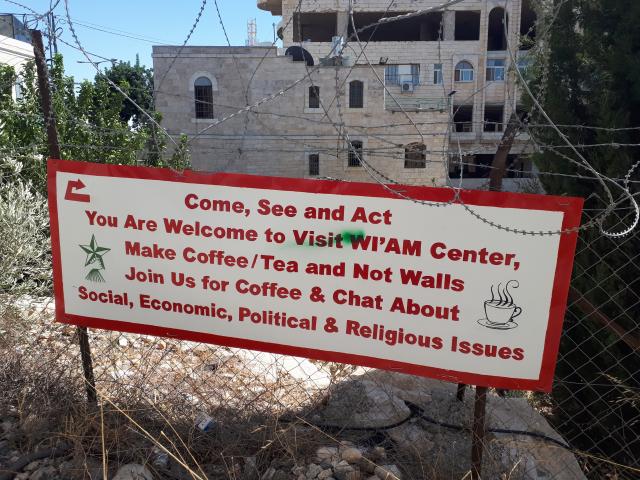In this Advent reflection, Shanna Bernier finds that even in times of great upheaval and change, deep moments of peace exist.

Shanna Bernier shares a series of Advent reflections based on the experience of visiting Palestine-Israel on a young adult pilgrimage in August 2019. Eleven young adults and two facilitators travelled to Bethlehem to connect with their Christian roots, meet with United Church partners, and hear stories from Palestinians and Israelis about why this land is so sacred. They listened to stories and witnessed many tragic effects of the ongoing occupation. They also experienced moments of deep peace, overwhelming joy, unyielding hope, and passionate love.
Shanna’s wish is for these reflections to inspire readers to explore the stories of Palestinian and Israeli people and to connect to the divine humanity in each story.
Peace
The second theme we mark on our Advent journey is peace. Like hope, peace is sometimes out of our grasp or only aspirational. On my own journey in the Holy Land, I enjoyed many moments of Peace. I stood with my feet in the Sea of Galilee, overwhelmed by the beauty of the place where Jesus and his friends had lived and worked and I felt a deep calm in my heart.
When I imagine Mary and Joseph, the times they lived through and the both literal and emotional journeys they had to undertake, turmoil feels like a more likely adjective than peace.
However, even in times of great upheaval and change, moments of peace exist. In Palestinian communities living with the tension of military occupation, and at times only tenuous religious tolerance and a complex tapestry of cultural and ethnic differences, it is easy to see how conflict would be the reigning status in all aspects of life. This conflict is not a simple “us versus them,” because of the diversity of both the Israeli peoples and the Palestinians. There are dozens or narratives at play.
Inside of conflict, we see the glimmers of peace. We see organizations like the Wi’Am Center holding conflict resolution programs to help Muslim and Christian Palestinians, who may come from a multitude of different tribal and familial lines to work out their conflicts peacefully amongst themselves. We heard countless stories of creative, nonviolent resistance to the occupation. Wi’Am’s sign outside the wall, which surrounds Bethlehem and cuts it off from surrounding lands, reads “Make Tea not Walls.”
I heard Palestinians say with deep and loving conviction how much they wanted peace, and would keep working for it because of their strong refusal to be enemies. In those moments, I did not necessarily feel peace, but I did feel the presence of God.
— Shanna Bernier lives with her family in Sherbrooke QC and is Program Support Minister for Youth and Young Adults in Nakonha:ka Regional Council. Her passions include children’s literature and making strawberry jam.
The views contained within these blogs are personal and do not necessarily reflect those of The United Church of Canada.